

Net neutrality gets a kick in the teeth. The United States Court of Appeals for the District of Columbia Circuit has ruled in the case of Verizon et al. v.
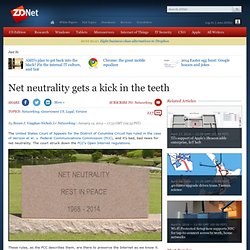
Federal Communications Commission (FCC), and it's bad, bad news for net neutrality. The court struck down the FCC's Open Internet regulations. These rules, as the FCC describes them, are there to preserve the Internet as we know it. Today's Internet is "open because it uses free, publicly available standards that anyone can access and build to, and it treats all traffic that flows across the network in roughly the same way. FCC approves plan to consider paid priority on Internet. The Federal Communications Commission on Thursday voted in favor of advancing a proposal that could dramatically reshape the way consumers experience the Internet, opening the possibility of Internet service providers charging Web sites for higher-quality delivery of their content to American consumers.
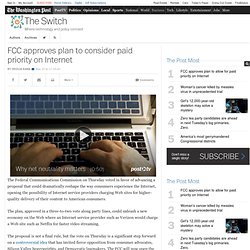
The plan, approved in a three-to-two vote along party lines, could unleash a new economy on the Web where an Internet service provider such as Verizon would charge a Web site such as Netflix for faster video streaming. The proposal is not a final rule, but the vote on Thursday is a significant step forward on a controversial idea that has invited fierce opposition from consumer advocates, Silicon Valley heavyweights, and Democratic lawmakers. Ted Cruz bill would ban 'FCC's latest adventure in net neutrality'
What the FCC's net neutrality vote means for the Internet. The Federal Communications Commission (FCC) on Thursday voted three-to-two to push forward a highly controversial proposal that critics argue could signal the end of net neutrality.
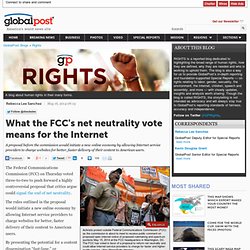
The rules outlined in the proposal would initiate a new online economy by allowing Internet service providers to charge websites for better, faster delivery of their content to American users. By presenting the potential for a content dissemination “fast-lane,” or prioritization, the proposed rules would mean that smaller companies that are unable to pay the toll “would likely face additional obstacles against bigger rivals,” according to the Washington Post. “And,” the article added, “consumers could see a trickle-down effect of higher prices as Web sites try to pass along new costs of doing business with Internet service providers. “Who gets to go fast and who gets to go slow?” New York Times media columnist David Carr asked in a video published on Thursday. JL: Not really. The FCC’s net-neutrality plan: Wheeler dealing.
ONE thing was certain when Tom Wheeler, a former cable-industry lobbyist who now chairs the Federal Communications Commission (FCC), formally unveiled his proposal for an “open internet” at a public meeting on May 15th: few people would like it.
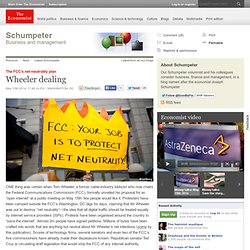
Protesters have been camped outside the FCC’s Washington, DC digs for days, claiming that Mr Wheeler was out to destroy “net neutrality”—the idea that all digital traffic should be treated equally by internet service providers (ISPs). Protests have been organised around the country to “save the internet”. Almost 2m people have signed petitions. Millions of bytes have been crafted into words that are anything but neutral about Mr Wheeler’s net intentions (some by this publication).
Scores of technology firms, several senators and even two of the FCC’s five commissioners have already made their displeasure known. None of this will solve American broadband’s most pressing problem: a near-total lack of competition. So what of today’s meeting? FCC Net Neutrality Petition: How to save the Internet. Net neutrality died back in January of this year when a U.S.
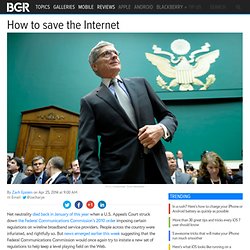
Appeals Court struck down the Federal Communications Commission’s 2010 order imposing certain regulations on wireline broadband service providers. People across the country were infuriated, and rightfully so. FCC Net Neutrality Complaints: Email FCC to complain. A few days ago, we wrote about how you can save the Internet.
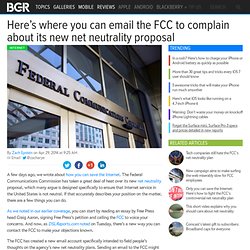
The Federal Communications Commission has taken a great deal of heat over its new net neutrality proposal, which many argue is designed specifically to ensure that Internet service in the United States is not neutral. If that accurately describes your position on the matter, there are a few things you can do. As we noted in our earlier coverage, you can start by reading an essay by Free Press head Craig Aaron, signing Free Press’s petition and calling the FCC to voice your concerns.
And now, as DSLReports.com noted on Tuesday, there’s a new way you can contact the FCC to make your objections known. Reclassify Internet broadband providers as common carriers. Maintain true net neutrality to protect the freedom of information in the United States. Prevent the FCC from ruining the Internet. FCC revising Internet rules after public backlash « KFWB NEWS TALK 980. WASHINGTON (AP) — Federal Communications Commission Chairman Tom Wheeler is broadening the scope of his proposed open Internet rules and suggesting tougher standards for Internet providers who wish to create paid priority fast lanes on their networks.
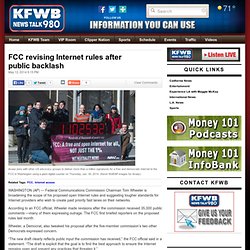
According to an FCC official, Wheeler made revisions after the commission received 35,000 public comments —many of them expressing outrage. Send Us Your Comments. Remove Tom Wheeler from his position as FCC Chairman. Submit a Filing. Skip to main content Electronic Comment Filing System site map FCC > CGB > ECFS Home Page > Submit a Filing For Information on Filing a Consumer Informal Complaint | ECFS Express Note: You are filing a document into an official FCC proceeding.
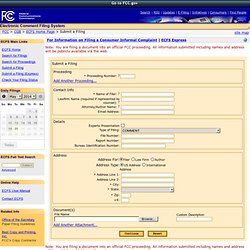
Submit a Filing Proceeding Add Another Proceeding... Contact Info Details. Sen. Al Franken: Media Mega-Mergers and FCC Rollback of Net Neutrality Threaten Democracy. This is a rush transcript.
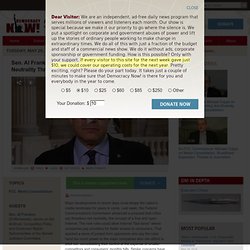
Copy may not be in its final form. AARON MATÉ: We begin with major developments that could shape the nation’s media landscape for years to come. Last week, the Federal Communications Commission advanced a proposal that critics say threatens net neutrality, the concept of a free and open Internet. The new rules could allow Internet "fast lanes" where companies pay providers for faster access to consumers. That sparked a wave of protest from opponents, who say the rules hand too much power to the major companies who can afford to shell out, consolidating their control at the expense of smaller competitors and consumers’ monthly bills. Similar concerns have been raised about a merger deal struck over the weekend. AMY GOODMAN: We turn now to one of the leading voices on Capitol Hill challenging media consolidation: Democratic Senator Al Franken of Minnesota. Welcome to Democracy Now! SEN.